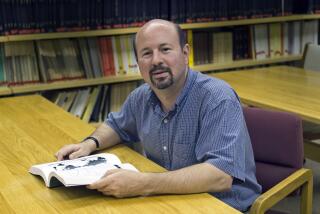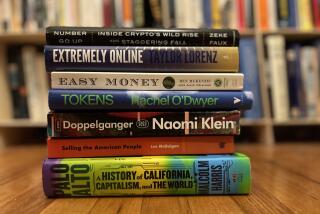Prize Bull
- Share via
The Los Angeles Times doesn’t usually print vulgarities, but I have received special dispensation to write about Harry Frankfurt’s book “On Bullshit” on the condition that I handle the word with discretion and restraint. Hereafter, I will mark many sentences where the reader may infer the word or concept with an asterisk. I am only too happy to oblige*.
Frankfurt, a professor emeritus of philosophy from Princeton University, originally published the work as an essay in the fall 1986 issue of “Raritan,” which I read faithfully*. It’s a slim volume, clocking in at 67 double-spaced, wide-margin pages, a fact that itself seems to scream for an asterisk. Any book that attempts to divine the greater significance of this concept in the Age of Spin, as Frankfurt’s does, ought to be the size of the Vedas.
For the record:
12:00 a.m. April 28, 2005 For The Record
Los Angeles Times Thursday April 28, 2005 Home Edition Main News Part A Page 2 National Desk 1 inches; 36 words Type of Material: Correction
Magazine column -- The 800 Words column in Sunday’s Los Angeles Times Magazine about the current bestselling nonfiction book by Harry G. Frankfurt referred to the Texas School Book Depository as the Dallas School Book Depository.
For The Record
Los Angeles Times Sunday May 15, 2005 Home Edition Los Angeles Times Magazine Part I Page 4 Lat Magazine Desk 0 inches; 25 words Type of Material: Correction
The 800 Words column in the April 24 issue (“Prize Bull”) incorrectly referred to the Texas School Book Depository as the Dallas School Book Depository.
“One of the most salient features of our culture,” begins Frankfurt, “is that there is so much bullshit. Everyone knows this. Everyone contributes his share. But we tend to take the situation for granted.... So the phenomenon has not aroused much deliberate concern nor sustained inquiry.”
Well, until lately. I would cite Penn and Teller’s hilarious* Showtime series of the same name debunking scams and paranormal phenomena. Next month a book titled “Your Call Is Important to Us: The Truth About Bullshit,” by Laura Penny, will hit bookshelves. Nick Flynn’s 2004 novel “Another Bullshit Night in Suck City” has what may be my favorite book title of all time.
Clearly, bullshit is hot.
Frankfurt is at pains to distinguish between bullshit and lies, though I think many readers will have trouble following him to this conclusion. The truth-teller and the liar, he argues, share an interest in the truth-value of their utterances, while the speaker of bullshit is essentially agnostic; he neither knows nor cares about the truth but only wants to advance an agenda, even if that agenda is only to hear himself talk.
A bullshitter may speak the truth -- “I voted for the tax cut before I voted against it . . . “ -- but only accidentally.
Put this way, bullshit is the ether of existential bad faith, and not falseness but phoniness. And since we only catch glimpses of our true selves, Frankfurt concludes, “Sincerity itself is bullshit.”
I don’t know about this. I smell an asterisk.
Written in the elegant, balance-beam prose of a professional logician, Frankfurt’s book comes off at first as satire, but as the pages fly by there is a gnawing sense of earnestness about it. He spends many pages parsing the difference between “bullshit” and “humbug”--a word absolutely no one uses unless they are staging “A Christmas Carol”--and many more pages fencing with the Oxford English Dictionary on the nuance of “bull,” to wit: “ . . . the OED suggests the following as definitive: ‘trivial, insincere, or untruthful talk or writing; nonsense.’ Now it does not seem distinctive of bull that it must be deficient in meaning or that it is necessarily unimportant; so ‘nonsense’ and ‘trivial,’ even apart from their vagueness, seem to be on the wrong track.”
Much of this, while fascinating*, seems a prolix path around the more important point that Frankfurt himself directs us toward in the first paragraph: We are drowning in bullshit. I mean, the Bush administration has practically made it a Cabinet position. And the most trenchant example Frankfurt can come up with is some crazy story about Ludwig Wittgenstein ripping a friend for saying, while sick, that she felt “just like a dog that has been run over.”
Though I’m not an emeritus anything, I’d like to help the professor out with a few more contemporary examples.
When ape-men such as Mark McGwire and Sammy Sosa--the latter having gained 50 pounds of gristle between college and pro ball--deny steroid use.*
When family-friendly NASCAR changes its policy on hard-liquor advertising because the spirits industry has “promoted responsible drinking.”*
When the makers of “JFK Reloaded”--a video game in which players occupy the sniper’s nest of the Dallas School Book Depository and try to cap Kennedy--claim they are helping students discover history.*
John Kerry duck hunting?*
Fair and Balanced? Total and unadulterated *** piled high and served as the blue-plate special.
All of these examples count on the naive or muddled credulity of the listener, a faith too often rewarded. The quality of mendacity is not strained.
The word Frankfurt gropes for but never quite finds is “unworthy.” Bullshit is unworthy of the speaker, the listener and the argument. So when someone says, for instance, that America has the best healthcare system in the world--an assertion provably at odds with the facts--this is bullshit, not simply because it is untrue but also because it is so paltry and sad that people of a great and declining nation believe it.
More to Read
Sign up for our Book Club newsletter
Get the latest news, events and more from the Los Angeles Times Book Club, and help us get L.A. reading and talking.
You may occasionally receive promotional content from the Los Angeles Times.








